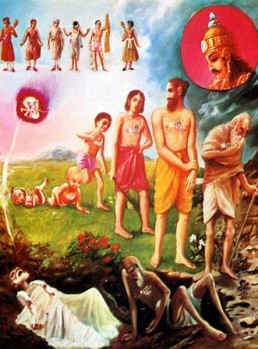Swami Chinmayananda Commentary
Being a man of action, extremely intelligent, and having not yet developed any blind faith in Lord Krishna’s divine potentialities, Arjuna still questions mentally, and the Lord, anticipasting his doubt, explains here why a man of true devotion to work should act, and with perfect evenness of mind strive to achieve. The wise, meaning those who know the art of true living, undertake all work, maintaining in themselves the full evenness of mind, and thus abandon all anxieties for the fruits of their actions. These two conditions, under which the wise work, bring out fully the picture of an individual who acts renouncing both ego and ego-motivated desires.
By identifying with the agitations of the mind, the ego is born, and, the ego so born gets riddled with desires as it gets anxious for the fruits-of-its actions. When one works with neither ego nor desires, one achieves vasana-purgation; this is possible only when one always has the Higher Goal in view.
Adi Sankara Commentary
The words ‘phalam tyaktva, by giving up the fruits’ are connected with the remote word ‘karmajam, produced by actions’. Hi, because; [Because, when actions are performed with an attitude of equanimity, it leads to becoming freed from sin etc. Therefore, by stages, it becomes the cause of Liberation as well.] buddhi-yuktah, those who are devoted to wisdom, who are imbued with the wisdom of equanimity; (they) becoming manisinah, men of Enlightenment; tyaktva, by giving up; phalam, the fruit, the acquisition of desirable and undesriable bodies; [Desirable: the bodies of gods and others; undesirable: the bodies of animals etc.] karmajam, produced by actions; gacchanti, reach; padam, the state, the supreme state of Visnu, called Liberation; anamayam, beyond evils, i.e. beyond all evils; by having become janma-bandha-vinirmuktah, freed from the bondage of birth — birth (janma) itself is a bondage (bandha); becoming freed from that –, even while living. Or: — Since it (buddhi) has been mentioned as the direct cause of the elimination of righteousness and unrighteousness, and so on, therefore what has been presented (in the three verses) beginning with, ‘O Dhananjaya,…to the yoga of wisdom’ (49), is enlightenment itself, which consists in the realization of the supreme Goal, which is comparable to a flood all around, and which arises from the purification of the mind as a result of Karma-yoga. [In the first portion of the Commentary buddhi has been taken to mean samattva buddhi (wisdom of equanimity); the alternative meaning of buddhi has been taken as ‘enlightenment’. So, action is to be performed by taking the help of the ‘wisdom about the supreme Reality’ which has been chosen as one’s Goal.]
The Bhagavad Gita with the commentary of Sri Sankaracharya – Translated by Alladi Mahadeva Sastry
Holy Geeta – Commentary by Swami Chinmayananda
The Bhagavad Gita by Eknath Easwaran – Best selling translation of the Bhagavad Gita
The Bhagavad Gita – Translation and Commentary by Swami Sivananda
Bhagavad Gita – Translation and Commentary by Bhaktivedanta Swami Prabupadha
Srimad Bhagavad Gita Chapter 2 – Verse 51 – 2.51 karma-jam buddhi – All Bhagavad Gita (Geeta) Verses in Sanskrit, English, Transliteration, Word Meaning, Translation, Audio, Shankara Bhashya, Adi Sankaracharya Commentary and Links to Videos by Swami Chinmayananda and others – 2-51

